Abstract
In “Moving towards a feminist epistemology of mathematics,” Leone Burton (1995/2008) argued for a feminist epistemology that is parallel to the epistemologies of other STEM fields, but a case unto itself because of the nature of mathematics. Her proposal defined knowing in mathematics in relation to five categories including social relatedness, the aesthetics of mathematical thinking, intuition and insight, recognition and celebration of different approaches and ways of thinking, and global applications. These categories incorporate processes mathematicians employ as well as the experience of the learner in constructing mathematical meaning.
Access this chapter
Tax calculation will be finalised at checkout
Purchases are for personal use only
References
Alcoff, L., & Potter, E. (Eds.) (1993). Feminist epistemologies. New York: Routledge, Chapman and Hall, Inc.
Alexander, F. K. (2000). The changing face of accountability: Monitoring and assessing institutional performance in higher education. Higher Education, 48(4), 411–431.
Blackburn, M. V. (2004). Understanding agency beyond school-sanctioned activities. Theory Into Practice, 43(2), 103–110.
Boaler, J., & Staples, M. (2008). Creating mathematical futures through an equitable teaching approach: The case of Railside school. Teachers College Record, 110(3), 608–645.
Burton, L. (1995/2008). Moving towards a feminist epistemology of mathematics. ZDM The International Journal on Mathematics Education, 40, 519–528.
Collins, P. H. (1989). The social construction of black feminist thought. Signs, 14(4), 745–773.
Collins, P. H. (1991). Black feminist thought: Knowledge, consciousness, and the politics of empowerment. New York: Routledge.
Collins, P. H. (2008). Black feminist thought: Knowledge, consciousness, and the politics of empowerment (2nd ed.). New York: Routledge.
Curtis-Tweed, P. (2003). Experiences of African–American empowerment: A Jamesian perspective on agency. Journal of Moral Education, 32(4), 397–409.
Damarin, S. (1991). Rethinking science and mathematics curriculum and instruction: Feminist perspectives in the computer era. Journal of Education, 173(1), 107–123
Damarin, S. (2008). Toward thinking feminism and mathematics together. Signs: Journal of Women in Culture and Society, 34(1), 101–123.
Damarin, S. K., & Erchick, D. B. (2010). Toward clarifying the meanings of “gender” in mathematics education. Journal for Research in Mathematics Education, 41(4), 310–323.
Erchick, D. B., & Tyson, C. (2008). Teaching social justice by the numbers: Toward a pedagogy of social justice in the MCP. In D. B. Erchick (Chair), Keeping the focus on social justice in a K-6 mathematics coaching program. Symposium presented at the National Council of Teachers of Mathematics annual research pre-session, Salt Lake City, Utah.
Glasser, H. M., & Smith, J. P., III. (2008). On the vague meaning of “gender” in educational research: The problem, its sources, and recommendations for practice. Educational Researcher, 37, 343–350.
hooks, b. (1989). Talking back. Boston: South End Press.
hooks, b. (2000a). Feminist theory: From margin to center. London: Pluto Press.
hooks, b. (2000b). Feminism is for everybody. Cambridge: South End Press.
Huisman, J., & Currie, J. (2004). Accountability in higher education: Bridge over troubled waters? Higher Education, 48(4), 529–551.
Schifter, D., & Fosnot, C. T. (1993). Reconstructing mathematics education: Stories of teachers meeting the challenge of reform. New York: Teachers College Press.
Author information
Authors and Affiliations
Corresponding author
Editor information
Editors and Affiliations
Rights and permissions
Copyright information
© 2012 Springer-Verlag Berlin Heidelberg
About this chapter
Cite this chapter
Erchick, D.B. (2012). Preface to “Moving Towards a Feminist Epistemology of Mathematics”. In: Forgasz, H., Rivera, F. (eds) Towards Equity in Mathematics Education. Advances in Mathematics Education. Springer, Berlin, Heidelberg. https://doi.org/10.1007/978-3-642-27702-3_2
Download citation
DOI: https://doi.org/10.1007/978-3-642-27702-3_2
Publisher Name: Springer, Berlin, Heidelberg
Print ISBN: 978-3-642-27701-6
Online ISBN: 978-3-642-27702-3
eBook Packages: Humanities, Social Sciences and LawEducation (R0)

